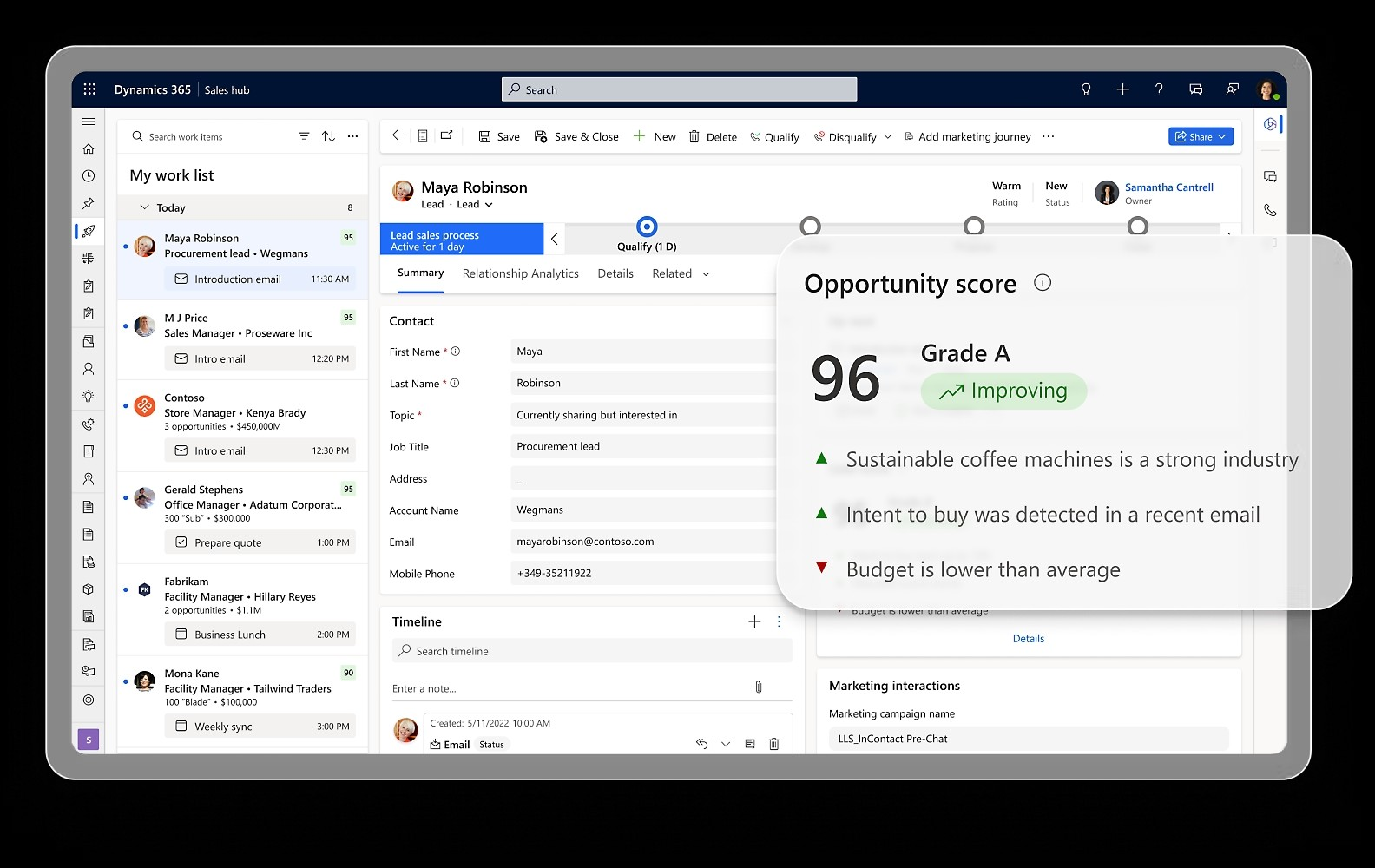In a rapidly evolving, increasingly competitive landscape, selling is harder than ever. In order to win over leads and close deals, sales teams need to be able to anticipate and address customers’ everchanging needs. On top of this, they need to deliver the right messages at the right time. All while ensuring their products and services stack up higher than the competition.
This means being proactive and accurate, leveraging data to build custom sales experiences that always exceed expectations and drive potential customers over the finish line. It’s a tricky job – especially when you have to do it across multiple leads in your pipeline or risk falling short of business targets.
That’s why having tools that make deal management easy are crucial to the success of any sales team. Dynamics 365 Sales is designed specifically to empower sellers, giving them access to the data they need to better nurture leads, improve win rates and juggle multiple deals at once.
In this blog, we explore the benefits of Dynamics 365 Sales and how it can help you hit targets effortlessly.
What is Microsoft Dynamics 365 Sales?
Dynamics 365 Sales is a CRM (customer relationship management) application, engineered to accelerate the sales management process. This involves activities such as pre-sales, prospecting, building the pipeline, qualification of leads and ultimately transforming them into customers.
D365 Sales provides sales executives with a blueprint for building relationships with potential and existing clients. It also offers insight on the requirements needed to close new deals and for the building of new competencies.
As a result, it can support sales personnel throughout the sales process, including enable them to make decisions based on intelligence and data, work better as a team and streamline task completion.

Image from Microsoft
With these features, D365 Sales boasts significant benefits for businesses. We delve into them next.
The benefits of Microsoft Dynamics 365 Sales
AI-powered sales intelligence
One of Dynamics 365 Sales stand-out features is its advanced AI capabilities (through integration with Microsoft Copilot), including predictive lead and opportunity scoring, and conversation intelligence. These features provide valuable insights that help sales teams prioritise leads, personalise interactions and close deals faster, integrated in the tools you already use.
Using Copilot within the CRM, users can get:
- Quick summarises of lead records and sales opportunities within the system, including an update on any recent changes
- Instantly pulled data from across your files for easier meeting preparation and reduced time searching
- Simplified email communication by summarising longer messages, helping sellers quickly grasp content and identify follow-up actions
It saves valuable time, allowing sellers to focus on connecting with customers instead.
Integration within the Microsoft ecosystem
D365 Sales can be integrated with multiple other systems for improved value, including Microsoft and third-party solutions. This increases inter-connectivity and system networking.
Below, we’ve listed some examples of software that combine seamlessly with D365 Sales for customisation and improved results.
1. Microsoft 365 suite
D365 Sales can be easily integrated with core software within the Microsoft ecosystem, including Outlook, Teams and SharePoint. These are apps your sales teams are likely already using and comfortable with.
By connecting them to your D365 Sales deployment, you can streamline tasks. Rather than having to move between tools, you can send emails, store files and communicate from one place. It provides ease and quick access for sales teams to perform optimally.
It will also enable you to maintain context across your Microsoft suite. For example, in a Teams call with a lead, the sales person can get insight on past interactions and other data to better tailor the discussion.
2. Dynamics 365
Alongside Dynamics 365 Sales, there are multiple tools within the D365 platform, designed to serve different business needs.
This includes the likes of Business Central (an ERP system), Customer Service and Customer Insights. D365 Sales connects smoothly to these different modules, allowing teams to get access to a wealth of data.
It improves workflows between teams, with updates made in one module flowing through to the rest, so everyone works from the same real-time insights and manual data entry is reduced.
3. Power BI
Power BI dashboards can be enabled within D365 Sales for access to high-level reports that drive data-backed decisions. Comprising a collection of applications and connectors, Power BI promotes business intelligence, reporting and data visualisation.
Power BI and D365 Sales ensure data sources are properly documented and transformed into informative insights to assist with sales and customer relationships.
Lead management
Leads are the wheels of any sales transaction. As the foremost stage of any sales operation, being able to attract and manage leads is crucial.
The technologies within D365 Sales drive change within the lead generation and management process. It helps in the efficient management of short and long-term leads throughout the entire sales process, making it easier to reach positive outcomes.
Furthermore, it empowers data analysis for a firmer grasp on prospect identification and development. This allows you to target more leads that fit your ideal prospect profile.
Enhanced sales process automation
Sales teams’ time is often absorbed by mundane administrative tasks like email writing, follow-ups, note taking, reporting and client calls.
Dynamics 365 enables businesses to automate and standardise sales processes, streamlining workflows and reducing manual tasks. Features like the Sales Accelerator provide prioritised task lists and automated sequences, ensuring that sales teams focus on high-impact activities. Plus, with automated workflows, reminders of upcoming actions and context in one location, manual data entry and admin work is reduced.
AI-powered functionality can also help sales people to generate emails, make notes and decide next steps in a fraction of the time. Productivity rises, with sales teams able to focus on more important tasks – like meeting customer expectations.
Data-driven decision making
Dynamics 365 Sales provides robust analytics and reporting capabilities, giving sales teams real-time visibility into sales performance, customer behaviour and market trends. The integration with Power BI allows for deeper data analysis, empowering sales teams to make informed decisions. This unified view eliminates data silos and ensures that decision-makers have access to a comprehensive picture of the business.
By incorporating AI and machine learning, Dynamics 365 can also provide predictive insights, such as forecasting sales trends, identifying potential risks, and predicting customer behaviour. This supports businesses in anticipating future outcomes and making proactive decisions.Scalability
Dynamics 365 Sales is built with scalability in mind, allowing businesses to adapt to growth and changing demands. The foundation of this lies within the Microsoft cloud infrastructure, which provides the capacity to handle increasing data volumes, user loads and transactional demands. This means that as a company expands, Dynamics 365 Sales can grow alongside it, without requiring disruptive overhauls.
Dynamics 365 Sales’ scalability is also supported by Microsoft’s ongoing investment in its cloud infrastructure and platform updates. This ensures that the platform remains up-to-date with the latest technologies and can handle future growth. This future proofing allows companies to invest in Dynamics 365 Sales with confidence, knowing that it can support their long-term growth plans.
Mobile accessibility
Dynamics 365 Sales’ mobile accessibility is a crucial feature in today’s fast-paced business environment, enabling sales teams to stay connected and productive regardless of their physical location. The mobile app provides a streamlined and intuitive interface that allows users to access and manage critical sales information, such as customer data, opportunity details and activity tracking, directly from their smartphones or tablets. This ensures that sales professionals can stay informed and responsive, even when they are away from their desks.
The mobile app’s functionality extends beyond simply viewing data. It empowers sales teams to perform a wide range of tasks, including creating and updating records, scheduling appointments, logging calls and accessing real-time dashboards and reports. This mobile capability allows sales representatives to manage their workflows efficiently, capture important information on the spot and respond promptly to customer inquiries. Offline capabilities ensure that users can continue to work even without an internet connection, with changes automatically syncing when connectivity is restored.
Get started with Dynamics 365 Sales
Dynamics 365 Sales offers significant advantages for any organisations. It enhances the sales outlook of a business for up-scaling, quicker closing of deals and sales revenue boosts.
With in-built advanced features, it can help you spot prospects, enhance value for existing clients and relationship building. Plus, the addition of Copilot, system integration and automation will reduce the workload faced by your sales people, freeing them up for high value work that wins deals.
Microsoft also offers a range of licences for D365 Sales, allowing you to find an option that suits your budget.

